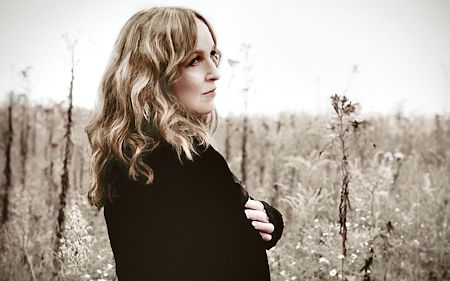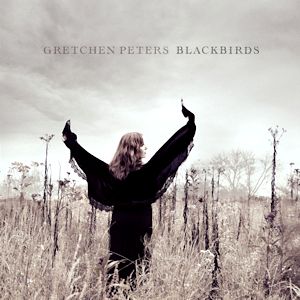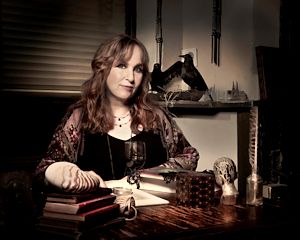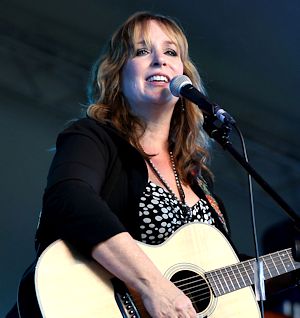DAVE'S DIARY - 5 OCTOBER 2015 - GRETCHEN PETERS CD REVIEW
2015 CD FEATURE
GRETCHEN PETERS
BLACKBIRDS (SCARLET LETTER RECORDS)
UNSEASONAL BURNING OF THE CANE FIELDS
“Come harvest in the cane fields the sky burns black with smoke/ so I took my father's gun and a heavy piece of rope/ and I left you lying there like rotten fruit on the ground/ and I lit a torch and I burned the whole thing down.” - Blackbirds - Gretchen Peters-Ben Glover.
 |
Gretchen Peters has long been a supreme mistress of murder ballads where her femme fatales deliver summary justice with fiery results.
It first happened in 1994 when Kansas chanteuse Martina McBride took Independence Day - Peters' anthemic domestic violence parable about the daughter of a bashed mother who burns down the perpetrator's home - to chart tops.
It was accompanied by a graphic video that also won awards and acclaim.
This time the victim in Peters' eighth album title track also delivers summary justice in a cane field to the paternal pariah who torments his wife and daughter.
But this time the video is delivered as an animated record of the aftermath.
“I was intrigued with the idea of writing a murder ballad," Peters, now 57, revealed.
"When I have those sort of generic thoughts that are more themed, I usually just wait. It's like kind of planting a seed. Eventually, the song will manifest itself."
Peters, born in Pelham , New York and raised in Colorado , wrote Blackbirds with young collaborator Ben Glover from the small village of Glenarm on the Irish seaside.
"It was the first song I wrote with Ben," Peters says of the title cut for the disc that followed her 2012 album Hello Cruel World.
"He had been on the road with us for three tours, so we have a lot of comfort level together because we knew each other well. But it was quite a thing to dive in to the first song we wrote together and have it be that. But he's an Irishman; they're constitutionally built to handle that sort of stuff."
The duo approached it as if solving a crime, hunting down clues in a far different vein to singing Texan crime novelist Kinky Friedman.
"When you write a song like that and it's a little bit murky, you have to know in your mind what's happening," she added.
"But it's like Ernest Hemingway's iceberg theory. You have to leave a lot of it submerged, but you have to know what that submerged part looks like in order to write with any kind of impact and truth."
But a different type of mortality inspired the theme of the entire album.
"It was having a parent who is in her 90s,” the latter day Nashville Songwriters Hall Of Fame member explained.
“The first summer that Ben and Mary Gauthier and I were writing songs, I had this little writing room that overlooks our neighbor's garden. My neighbor was in his 80s, and he died. Ben and his wife Emily were getting married. It all conspired to where there was this one week I ended up going to Ben's wedding and three memorial services, for this neighbor and a couple of friends. It hit me like a ton of bricks: 'This is how it is now.' There was a time in my life when I would go to a couple of weddings in a week maybe. But now I go to these three memorial services and in the middle of it there's this wedding, thank goodness! It's just reality. I wanted to deal with it."
"I thought, 'Oh great, so you write this sort of existential crisis album and now it's going to be death. Who's going to be interested in that?' That conversation in my mind takes about 30 seconds and then it's, 'Yeah, but that's what's going on, so you're going to be dealing with it.' It's not like you sit down and say, 'I'm going to write 11 songs about death.' You write the songs and then they manifest themselves. Themes become apparent. It's not really my choice. It was just hanging around and it's a really interesting subject. It's the big ones, love and death - what else you got? I think I'm in a unique position to be able to not give a shit what people think. Who's going to stop me?"
HAMMER NAILS MEMORIES
“Well he came home from the desert/ with a medal on his chest/ like a hero, like a champion/ but he felt more like a guest/ now he sleeps with one eye open/ and he wakes up scared as hell/ and all he's got is a hammer/ and everything looks like a nail.” - When All You Got Is A Hammer - Gretchen Peters.
 |
The title track segues into Pretty Things - another collaboration with Glover - where the vanquished victim erodes the pain of vanity with wine and pills. She reaches way back to the tempests and fall of Pompeii and Athens with weather metaphors for losses. “I had this idea, which essentially became the first verse, about this woman talking about aging and needing her stock, or her looks," Peters revealed. "I felt it was something I wanted to tackle, but it wasn't something I wanted to do head-on. I ended up playing it for Ben when we were writing songs for this album. It ended up being more about all the things we lose along the way. |
"There was a mention about the Nashville flood of 2010 in the second verse. That experience is still with me - the fact that you can lose so much in such a seemingly non-dramatic kind of way. The sun was out, and the worst damage had actually taken place while the sun was shining. I'm happy we were able to take it in more of a metaphorical territory."
Peters delves deep into the universal ticking time of post-traumatic stress of service personnel returning from war zones to a civilian life where they have little success in adjusting.
She paints a devastatingly accurate portrait in When All You Got Is A Hammer with Jason Isbell on guest vocals.
It was a theme also explored in the Clint Eastwood move American Sniper .
Peters also personalises families suffering in the aftermath of the BP oil slick disaster in the Gulf Of Mexico in Black Ribbons that she penned with Matraca Berg and Suzy Bogguss.
It examines the tale of a fisherman coming to terms with his wife's death in the oil spill aftermath.
Peters' collaboration with writers diverse as Matraca, Suzy and Ben, is a contrast to her penchant for writing alone.
"When I first got to town I thought there was something wrong with me that I didn't get into this co-writing thing," Peters confessed.
"It took me long enough but I finally figured out that I have to have a seriously deep level of trust. I think that's why I couldn't co-write in the way that a lot of people do here. I always felt like that was kind of like going on a blind date naked. It was so incredibly awkward and uncomfortable. So I just didn't do it.”
The Country Music Hall of Fame honored her with a full career retrospective in its Poets and Prophets series.
So her admiration for younger fellow tunesmiths has long been evident.
“Well, I'm always rooting for the singer-songwriters,” Peters explained.
“That's the music I came up on, and means the most to me.
“I think there's a place for everything, but especially the young women in the mainstream country world like Brandy Clark and Kacey Musgraves. I'm excited to see them do well.
“Although I don't really intersect with that world much anymore, I did at one point, and really love to see these women kicking down some walls and writing more lyrically-pointed songs.”
THE HOUSE ON AUBURN STREET
“The house on Auburn Street is burning to the ground/ fire trucks on the lawn and a crowd is gathered around/ an apparition in a small suburban town/ the house on Auburn Street is burning to the ground.” - The House On Auburn Street - Gretchen Peters.
 |
Peters was raised in the suburbs of New York before blazing a trail with her own bands in Colorado before making Nashville her touring and recording base. Her international touring has taken her to Europe and even Australia where she performed live in the Nu Country FM studio in a former dental surgery in Harley House at the Paris , Texas , end of Collins St . It was there she was photographed by the late musician and DJ Hans Herdina for Herald Sun and Geelong Advertiser feature stories. |
But it's not Paris but Pelham she reaches back to the secret darkness of her childhood home in the cinematic snapshot of The House on Auburn Street .
Her solitary cover is the joyous David Mead tune Nashville.
“That song has been in my life for 10 years, and brought me to David Mead, who wrote it,” Peters revealed.
“And we ended up writing a singing a song together on my Burnt Toast and Offerings album.
“I've wanted to sing that song since I first heard it, but David's version is so beautiful that I was put off recording it, wondering how I could ever improve on it. But eventually I just thought I wanted to sing that song, and felt it belonged on this album.”
“ Nashville really is my home and I've been accepted there in every possible way. This is perhaps a wonderful way to express that.”
She also finds a perfect duet partner in Texan singer-songwriter Jimmy LaFave for the evocative When You Coming Home where the soundtrack is embellished by “banging on the ceiling, banging on the floor/ water pipes are freezing and my key don't fit the door.”
"I'm just really interested in what goes on internally with people that makes them do bad things or hurt each other," Peter says.
"There's a little bit of something in me, and I haven't really examined it, but there is a little bit of revenge fantasy that seems to thread its way through my work and rear its head from time to time. Human nature is really fascinating to me – why people do what they do and what their internal process is. What's going on in there?"
She follows it with the evocative mortality tale Jubilee where her parents passing is tempered with love.
THE CURE FOR THE PAIN
“There ain't no boat, there ain't no train/ to take us back the way we came/ ain't no shelter from this hard rain/ the cure for the pain is the pain.” - The Cure For The Pain - Gretchen Peters
Peters produced her album with pianist husband Barry Walsh and multi-instrumentalist Doug Lancio.
"We had two tracking days in the studio and we had a bigger band than I've ever had on the floor before," Peters says of the Blackbirds sessions.
 |
"We had seven people on the floor tracking, which is a huge amount of people. Normally it would be four or five. So, what I was hearing in my headphones sounded really complete. It wasn't just bare bones, it was this big band. That was intentional in the sense that I wanted to get as live of a recording as we could get. It inspired me just hearing all that great sound coming back at me in the headphones, and it inspired me to sing like it was a performance rather than just like I'm laying down the song. I ended up keeping five or six of the track vocals. I wanted them to be somewhat raw because the songs were raw." She met Walsh after moving to Nashville from Colorado. |
“I was always my own entity. I had bands when I was coming up in Colorado in my 20s, but always under my own name,” Peters says of her transformation to solo artist.
“I always knew I was too head-strong to work in a democracy! I was so directed as a songwriter, and knew I wanted to sing my own songs and that was the path for me.”
And Walsh?
“He played on that first album. He'd been playing on my demos a few years at that point, including my second set of demos. I never called another piano player after that - he had such an affinity for my songs.”
Texan born singer-songwriter Rodney Crowell presided over their wedding.
“Rodney Crowell married Barry and me four years ago and we asked him to sing his song I Know Love is all I Need and the song actually starts out with him talking about his parents, seeing his parents in a dream as they've both gone now, that verse was extremely meaningful to us, getting married in our middle age,” Peters explained.
“Both of us had lost our fathers very recently, that is absolutely a defining moment of middle age and there is just an unhealthy taboo about what you can talk about, but I find that the people I end up playing for every night are hungry to hear someone tell the truth about those things.”
Peters ends her album with personalised mortality tune The Cure For The Pain - “it's not like you think it's gonna be/ not like the movies that you see/ ain't no soaring violins/ just machines and medicines.”
And she drew from recent reality.
"Part of it was that I have a mum who's in her 90s," Gretchen explained.
"And part of it was that I got married for the second time just four years ago. You're so exquisitely aware of how limited your time is when you're really happy. And the summer I was writing the songs, I was invited to my co-writer's wedding. It just happened that same week I also went to three memorial services. It hit me like a ton of bricks: This is how the ratio changes as you get older. You understand the fragility of life, and the beauty of two people promising to weather it together.”